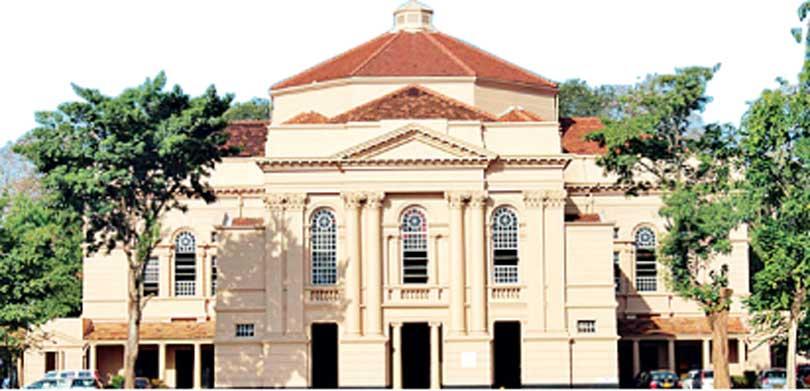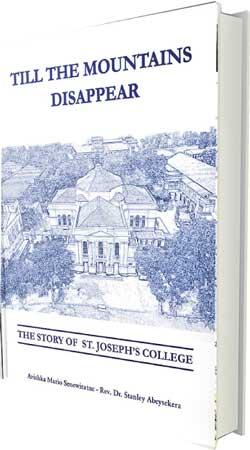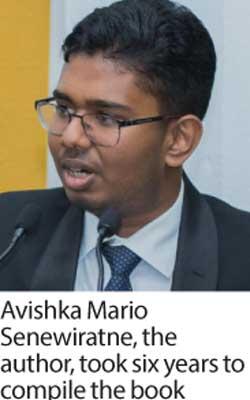09 Feb 2021 - {{hitsCtrl.values.hits}}

The collection of facts in the book are so vast and just too fascinating

My first contact with young Avishka Mario Senewiratne was when he called me on a Sunday morning in early January and requested me to keep the date free to attend the launch of his book, “Till the Mountains Disappear – The story of St. Joseph’s College”. This was followed with a formal invitation and of course, I was more than happy and excited to be once again connected with the College that I was so close to, during my school days. It was not only because St. Joseph’s College was the brother school of St. Bridget’s Convent, the school that I attended, but also because my father, Reggie Goonetilleke and my three brothers, Gamini, Anslem and Ravi all attended this Catholic Educational Institution. My father’s brothers and my cousins were also all Josephians.
 The College premises itself was quite familiar to me in my younger days as many were the times that my parents and I were at the School grounds to witness the countless rugby matches that my three brothers were playing in. So, for me Avishka’s invitation was a golden opportunity to go down memory lane to the hallowed portals of this esteemed institution.
The College premises itself was quite familiar to me in my younger days as many were the times that my parents and I were at the School grounds to witness the countless rugby matches that my three brothers were playing in. So, for me Avishka’s invitation was a golden opportunity to go down memory lane to the hallowed portals of this esteemed institution.
Never in my wildest dreams did I expect such an excellent compilation of the story of St. Joseph’s College. As soon as I turned the cover page I was enamored by the sketch of the College and the 12 other sketches that followed, providing a bird’s eye view of the entire school. I was more than captivated by the sketch of ‘Dinky the Donkey’ and Fr. Don Peter while the sketch of Fr. Maurice Le Goc conducting a lesson in astronomy had such a charm of its own. The drawing of the grand opening of the College with horse and carriage, flag waving schoolboys and a rickshaw in the background has so much charisma, and indeed is an everlasting tribute to the school. For Avishka to even think of including such momentous flashes of the school history portrays his depth of perception of the chronicle he was compiling. Then the maps of British Colonial Colombo are indeed collectors’ items by themselves.
It was Rev. Dr. Stanley Abeysekera who initiated this compilation and eventually when he was failing in his health, entrusted the mission to his student, Avishka. His painstaking effort to take this very challenging task to completion after 6 long years of research, splendidly portrays the passion, competence and far sighted vision of this young lad.
The chronicle takes the reader through the beginning of the College in 1896, the founding and opening of St. Joseph’s College the eras of the several Rector’s of the College, the bungalows, the buildings, the halls, the chapel, the pool, the pavilion and the sports complex cum auditorium. The book continues to cover the inception of the blue and white magazine, lists of priests who have served the college, the chief guests at prize giving’s, the many jubilarians, head prefects, the old boys union and the Josephian awards of excellence.
It was indeed most refreshing to note that the College Annual Prize Giving has been held annually from 1897 other that in the years of World War 1 (1914-1918). I was happy to note that the Prize Giving was held privately at St. Bridget’s Convent where no British troops were stationed at the time when the College was in exile; a fact that was unknown to me.
I was delighted to see St. Bridget’s Convent mentioned many more times and this is a message to all Bridgetines young an old to realise how well the College and the Convent worked together. Another reference to St. Bridget’s Convent in this chronicle goes on to say that “At the request of His Grace Dr. Th. Melizan, the Good Shepherd Sisters were able to buy “The Firs” at Turret Road Colombo and start a new school for girls, that is generally for the sisters of the boys who were attending St. Joseph’s College”. This detail definitely stood strong as our brothers were all at St. Joseph’s College and on ‘Big match’ days it was always the Josephinas who scaled the Convent walls waving their blue and white flags.
 A further interesting aspect of the Bridgetine connection as told in the book is the ‘Carnival’ that was organised by the Old Josephians and the old Bridgetines; where for the Josephians it was the celebration of the Golden Jubilee of the College while for us Bridgetines it was the 25th anniversary of the Past Pupils Association. It was fascinating to note that by the final day of the Carnival everybody had claimed that it was one of the best Carnivals seen in Colombo at that time. A special song that was compiled by Mr. P. M. Perera for the occasion ended as “Go all in, go all out, Josephians and Bridgeteens, There is a thing to shout about, And a toast to pledge in wine”. What more can we ask for in a connection? Incidentally, Avishka himself is a Bridgetine as he attended the SBC Montessori for three years before going on to being a student of SJC. I may not be wrong if I say that the Montessori holistic approach to education laid the foundation for Avishka to drive his ambitions and strive for excellence.
A further interesting aspect of the Bridgetine connection as told in the book is the ‘Carnival’ that was organised by the Old Josephians and the old Bridgetines; where for the Josephians it was the celebration of the Golden Jubilee of the College while for us Bridgetines it was the 25th anniversary of the Past Pupils Association. It was fascinating to note that by the final day of the Carnival everybody had claimed that it was one of the best Carnivals seen in Colombo at that time. A special song that was compiled by Mr. P. M. Perera for the occasion ended as “Go all in, go all out, Josephians and Bridgeteens, There is a thing to shout about, And a toast to pledge in wine”. What more can we ask for in a connection? Incidentally, Avishka himself is a Bridgetine as he attended the SBC Montessori for three years before going on to being a student of SJC. I may not be wrong if I say that the Montessori holistic approach to education laid the foundation for Avishka to drive his ambitions and strive for excellence.
The appendices that follow portray reminiscences of distinguished Priests and old boys. Parts or all of these experiences and memories, may have been told before, but I am almost certain it was not with such brightness and authority. The collection of nearly 200 pictures spanning 125 years, undoubtedly tells its own story. Pictures of Rectors, Buildings, the College staff of 1896, the First Tennis Club of 1912, Boarders of 1914, the 1st Cricket team, several Sports team along the years, openings and special events are just a few of them. Old boys who were team members of the various College sports activities are bound to find their team picture in the book. The collection is so vast and just too fascinating. The review will not be complete if I do not mention Kevin Caspersz, the master sketcher and Nilantha Perera, who assisted Avishka in many aspects of this compilation. This is Avishka’s first compilation of history and more so of his school history. He undoubtedly has complete control of the story and his style of absorbing and conveying all that this school has been, has been done with such brilliance. The chronicle has richly developed language, but still so readable and clear with such freshness, intensity and power. It easily surpassed my expectations of a book of history from one so young. Avishka’s first ever effort reads like the work of an author who has published many books over several years.
I have great pleasure in fully recommending this hard cover collector’s piece of 246 pages, “Till the Mountains Disappear – The story of St. Joseph’s College” not only to all Josephians, but also to Bridgetines and more so to all those who are interested in History. It is indeed an epic and memorable road trip, which will leave you with a lot more than just memories, but with immense enjoyment in every bit of the journey.
(Dr. Nirmala M. Pieris (nee Goonetilleke) was the Head Girl of St. Bridget’s Convent in 1966 and the President, of the Past Pupils Association of the School from 2012 to 2014) NMP:03022021
27 Nov 2024 8 minute ago
27 Nov 2024 18 minute ago
27 Nov 2024 22 minute ago
27 Nov 2024 40 minute ago
27 Nov 2024 1 hours ago